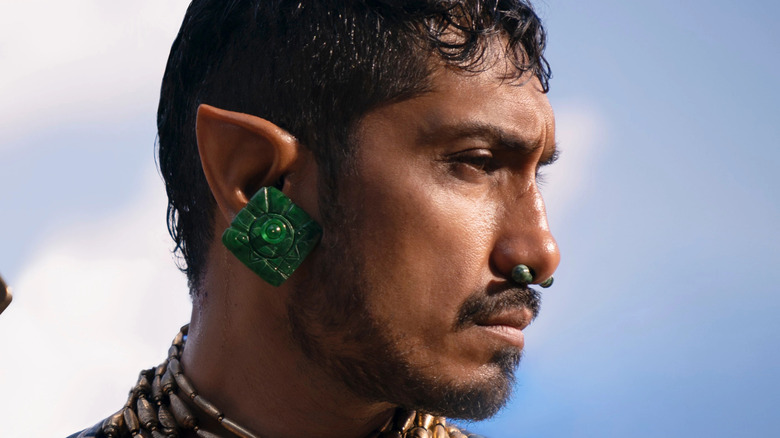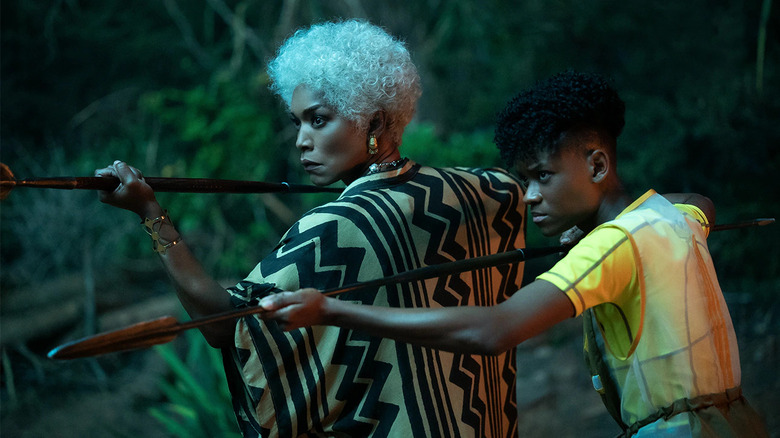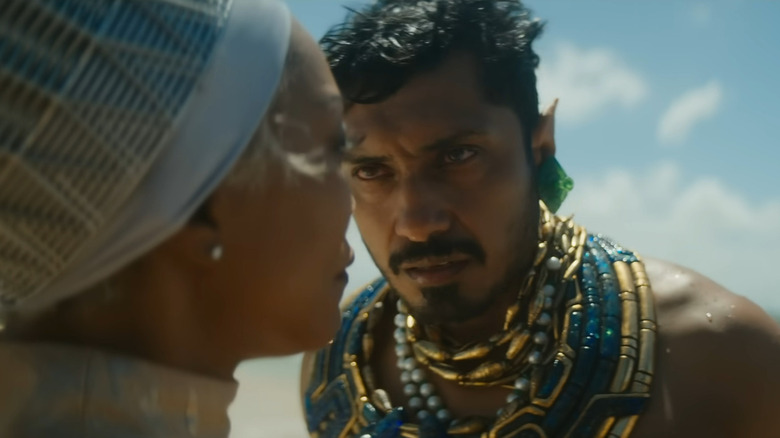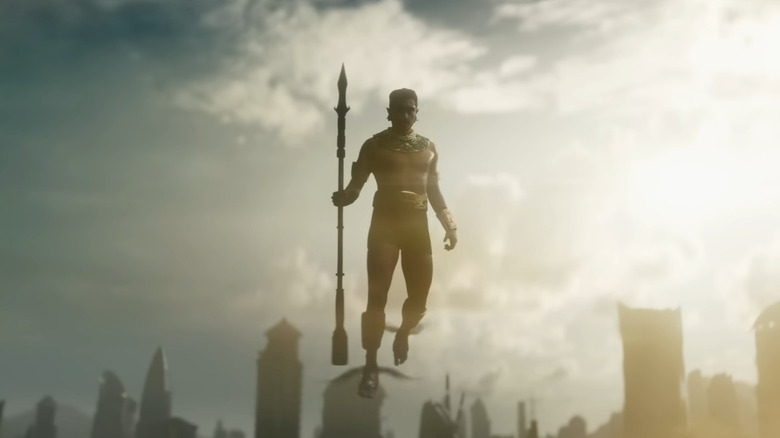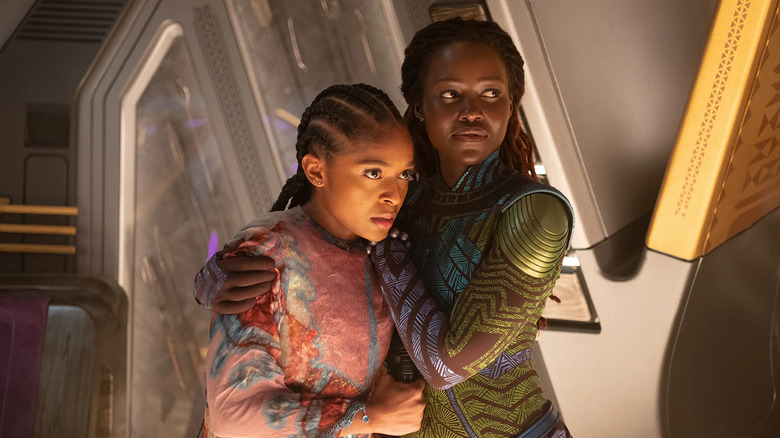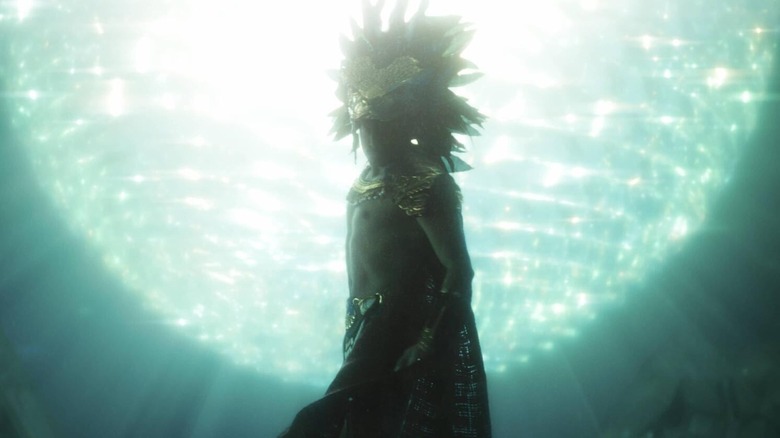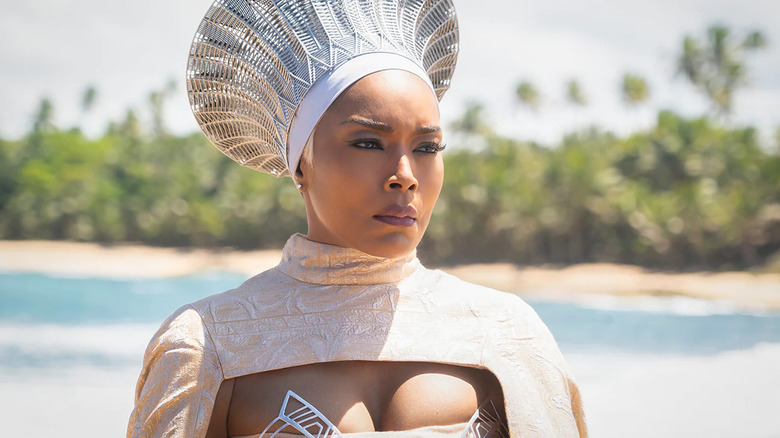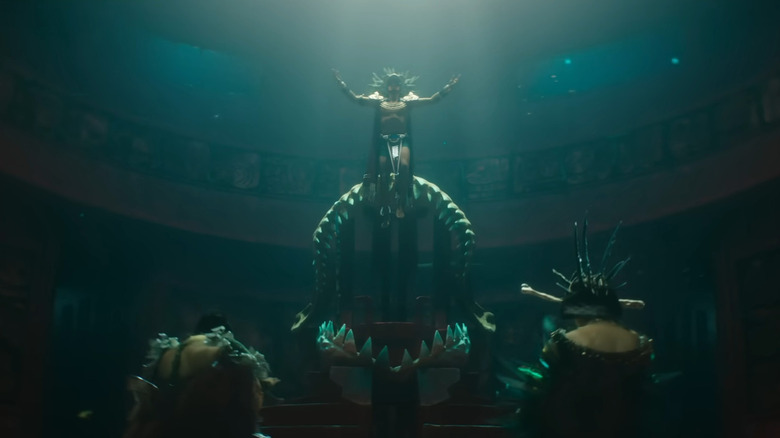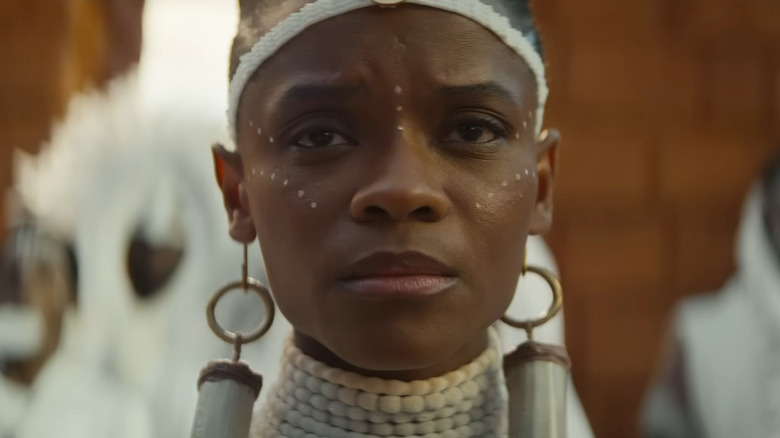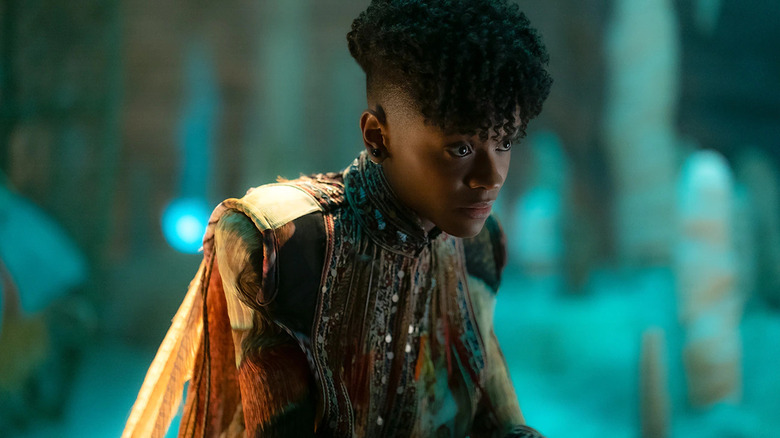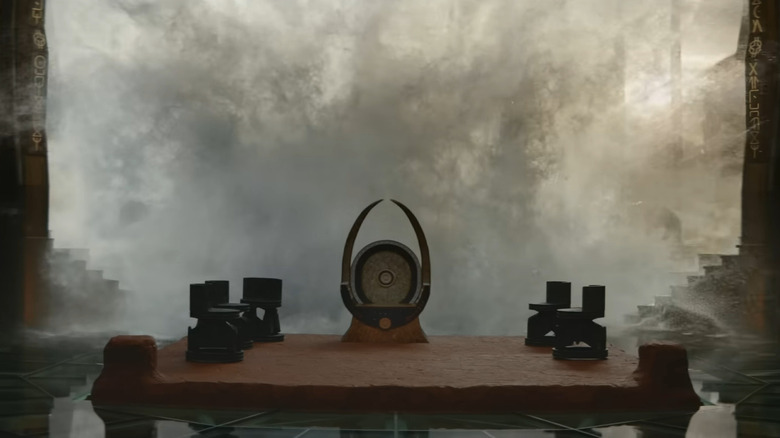Namor's Best And Worst Moments In Black Panther: Wakanda Forever
Contains spoilers for "Black Panther: Wakanda Forever"
"Black Panther: Wakanda Forever" brings the classic Marvel character Namor (Tenoch Huerta) to the MCU, but he's a bit different here than his comic book counterpart. Not only is he now the king of Talokan instead of Atlantis, but he's also far older, having been born on the Yucatan Peninsula in the early 16th century. One way in which the MCU's Namor is similar to the original character, however, is the gray area he inhabits. He cares only for the well-being of Talokan and its people, and he's willing to go to extremes to protect them from harm.
In "Wakanda Forever," that conviction leads Namor into a violent conflict with Queen Ramonda (Angela Bassett), Princess Shuri (Letitia Wright), and the rest of Wakanda. Though he and Shuri see eye to eye on many things, and they even briefly seem to be friends, their respective duties and opposing viewpoints bring about a lot of harm on both sides.
Saying that Namor is a villain in "Black Panther 2" would be an oversimplification. So too would be classifying him as a hero, though he certainly is one to his people. What we get instead is a complicated, sympathetic, and occasionally detestable character. So let's explore some of Namor's best and worst moments in "Black Panther: Wakanda Forever" to get a better picture of who K'uk'ulkan really is.
Best: Namor's introduction
Let's be real for a second and admit that whatever you may think of Namor, he has a pretty fantastic introduction. While Shuri and her mother are having a heart-to-heart about T'Challa's death on the side of a river one night, they notice a small group of nearby elephants get spooked and race out of the water. Knowing what such a thing could mean, the two women ready their spears, only to see Namor rise out of the water on the wings of his ankles — part of his mysterious mutation.
Tenoch Huerta does a spectacular job in this first scene. He immediately establishes what kind of character Namor is: a smart and charismatic person who's not to be trifled with. To his credit, he pulls no punches and has no tricks up his sleeve here. Does he make threats? Yes. But he's also honest. He tells the Wakandans that his people are now in danger because they chose to reveal themselves and their vibranium reserves to the world. For that reason, he considers them responsible for the attack against his people, and they now owe him the debt of killing the American scientist responsible for building the vibranium detector now being used by the U.S. government.
This is a fantastic intro for a few reasons. It establishes Namor as a real threat who can stand against Wakanda's might. And it shows that he's a fair person, in his own way, but also a dangerous one. Well done, Ryan Coogler.
Worst: Threatening Queen Ramonda
The second time Namor meets with Queen Ramonda, he isn't as gracious. He knows that the queen is desperate to secure her daughter's safety, having already lost her husband and son. Unfortunately for her, Namor will only accept one thing in exchange for peace with Wakanda — an agreement to wage war against the rest of the surface world, to secure the safety of both nations.
This is when the venom in Namor really becomes visible. He explicitly threatens Shuri — someone he's just spent hours treating courteously and getting to know — and tells the queen outright that he will kill her if she doesn't meet his demands. Does this mean that Namor's previous hospitality was all a ruse? Not necessarily. It's simply a sign that nothing will ever be as important to him as the safety of Talokan.
However, this scene also shows that Namor's desire to protect his people is extreme. He has every right to despise surface nations and colonizers given the history of his people. And his loyalty to his own is respectable to be sure. But what he's suggesting — in fact, demanding — is a genocidal act far beyond the provocations he's experienced. Whether or not Namor is right to take such a stance is left up to the viewer, but the ramifications of his radicalism are soon felt by every citizen of Wakanda.
Best: Burning the Spaniards
Thanks to some flashbacks, we get to see exactly why Namor hates the nations of the surface world so much. And as it turns out, he has some pretty good reasons. Before transforming into the water-breathing people of Talokan, his people lived in Mesoamerica, but tragedy struck when invading Spanish conquistadors brought violence, enslavement, and disease. The vibranium-enriched plant that ultimately saved Namor's people was found out of desperation, and they retreated to the sea once it became clear that they could no longer breathe air.
When Namor's mother died, however, she wished to buried in her homeland. So Namor — still a young child, but already immensely powerful — took her to the surface with a few warriors in step behind him. What he found was a disgusting sight — indigenous people in chains, forced to work under inhuman conditions by cruel European colonists. Namor responds in the only just way he can — violently. He and his warriors make short work of the Spaniards, set fire to their plantation, and set the prisoners free.
He also explains to Shuri that he took the name Namor from this encounter — a distortion of what one of the Spaniards calls him, the "boy without love." The fact that Namor would wear such a name like a badge of honor says a lot about the kind of person he is, and it shows how little respect he has for anyone who threatens his people. In this instance, it's easy to root for Namor's more extreme tendencies, and even easier to understand why his people revere him so fiercely.
Worst: Insisting on Riri's death
The divide between Talokan and Wakanda really comes down to a single ideological difference. Namor is happy to end an innocent life in the interest of protecting his people, and Ramonda and Shuri refuse to do that. Repeatedly, the Wakandans try to offer up alternative solutions to the issue of the vibranium detector, but Namor will have none of it. He insists that Riri Williams (Dominique Thorne), the young genius responsible for creating the device, dies to ensure another isn't made.
Namor's rage at the surface world is entirely understandable, as is his loyalty to his home. But he fails to recognize something that the Wakandans know well — that not every person in a corrupt world is guilty. Though she's hesitant at first about the whole situation, Ramonda soon comes to treat Riri like a daughter. She doesn't die because Namor attacks, but because she decides to go back for Riri, knowing that she may not live because of it. To her last breath, Ramonda embodies the ideal that innocent lives are always worth protecting, under any circumstances.
Namor doesn't care about Riri's innocence or about innocent lives in general. He only cares about the lives of his own people. This dedication makes him strong, but it also makes him vulnerable, as Shuri's intervention eventually makes him see.
Best: Showing Shuri his world
The best moment that Namor the Sub-Mariner has in "Black Panther: Wakanda Forever" may be the scene of him showing Shuri his world. When they arrive in Talokan, all traces of his villainous side fade away, if only for a brief moment. He excitedly shows her the children of the city playing, the beauty of the natural world around them, and the impressive structures he's constructed with vibranium to enrich the lives of his citizens.
"From the bottom of the ocean, I brought the sun to my people," he says to Shuri proudly. And it's true. Through the use of vibranium, light and life flood Talokan. In this moment, we can see the person Namor would like to be — a builder who spends his days improving life for his people and his nights reveling in the world they've created. Of course, there's a dark side to that part of him too.
As someone old enough to remember the very beginning of Talokan — and likely the man who laid every major brick — Namor will stop at nothing to ensure his creation lasts. "Talokan will not move again," he tells his people later in a speech. It's unclear if he's simply referring to their departure from the surface centuries before, or if the underwater city itself has had to relocate before. Either way, it's obvious that while Namor doesn't want to go to war, he'd rather fight than risk a single piece of his world being harmed.
Worst: Attacking Wakanda
After Shuri and Riri escape from Talokan with Nakia (Lupita Nyong'o), Namor decides that the time for peaceful negotiations is over. He gathers his forces, and before Wakanda can really prepare, he invades the capital city. Flood walls are shattered, water bombs are dropped, and the streets are ravaged by rushing water. The Talokanil follow after, decimating the city's structures and population in the process.
Namor isn't just the mastermind behind this attack — he's the tip of the spear. Flying on his ankle wings, he attacks the ships that come in response and eventually makes his way to the palace, which is left largely undefended in the turmoil. The fact that Namor endangers innocent civilians just to make the palace vulnerable is bad enough, but it's the success of his attack that really makes you hate him. After shouting at the queen, enraged that she rejected his offer of alliance, he floods the throne room in an attempt to kill both Ramonda and Riri.
Yes, the queen could have escaped. She could have left Riri to drown and pulled herself out of the water. But she chooses to go back, and it's Namor's attack that forces her to make that choice. Ramonda's death is the final straw for Shuri, setting in motion the violent climax that follows. We see Namor at his most vicious during his attack on Wakanda, and by the time he departs, we want to see him dead as badly as Shuri does. Of course, things aren't quite that simple.
Best: Protecting Talokan
Here's the thing about Namor's assault on Wakanda: He doesn't draw first blood. It's not just Shuri and Riri escaping that drives him to violence, it's the fact that Nakia kills two Talokanil when she breaks them out. One of the guards is still breathing when Namor enters the scene, and he holds her in his arms as she passes. Just before she dies, she asks him — her god and king — if he can save her, and the look of powerlessness and grief on his face is devastating.
This moment humanizes Namor immensely. It shows the weight he carries, which he's carried for hundreds of years. We know from Ramonda, T'Challa, and Shuri that it's hard to be the one calling the shots, but to be the one carrying your nation for centuries? It's almost too much to even process. What Namor does in response to this crime is extreme. It's violent and hateful, and it endangers countless innocent lives. But because of this scene, we understand why he does it. We may not like it, but Ryan Coogler and Tenoch Huerta make us understand why Namor goes to such great lengths to keep his people safe.
Worst: A (sort of) killing blow
At the end of "Black Panther: Wakanda Forever," Namor and Shuri have a brutal fight. While their followers are slugging it out on the Wakandan ship, the two super-folks are fighting to the (near) death on a piece of land nearby. By the end, both warriors are exhausted, even despite their respective superpowers. But while they both clearly have the intention of killing the other, Namor is the one who at least attempts to deliver a killing blow.
Running your opponent straight through with a vibranium spear isn't something you expect them to come back from. With this blow, Namor sticks Shuri to a rock and walks away, leaving her to bleed to death. Fortunately for her, the Heart-Shaped Herb makes her even stronger than Namor realizes, and she's able to survive the attack. But it's pretty clear that that's a surprise to him. He killed her mother, after all, so why should he have any qualms about killing her just because they bonded underwater?
To be fair to Namor here, the whole fight is a desperate struggle. He and Shuri are both on the brink of death throughout the brawl, and he's put in fight-or-flight mode the second she starts evaporating the water from his body. It's basically a slow suffocation, so it's kind of fair for him to fight back with lethal force. But it's also true that when Shuri gets a chance to properly finish him off, she chooses mercy over a killing blow.
Best: Agreeing to peace
After a long and drawn-out battle, Shuri has Namor dead to rights. She burns him, blasts him, and puts a blade to his neck. The voice of Killmonger rings in her ears and she prepares to take her vengeance. But then she stops. She remembers the tour of Talokan that Namor gave her. She remembered all the ways his people are just like hers in Wakanda. And she sees her own mother reaching out from the Ancestral Plane, telling her to show mercy. So instead of killing him, she demands that Namor yield.
If he only caved because of the threat of death, this wouldn't be as good of a moment for the Sub-Mariner. However, there's more going on here than just a desire to survive. At the same time that Shuri sees her mother, Namor sees his. It's unclear if this is a projection from the Astral Realm, a hallucination brought on by dehydration, or something else entirely, but the effect is clear. Namor realizes, at least for a moment, that there's more to life than vengeance. And thankfully for him, Shuri realizes the same thing.
Together, the two travel back to their warriors and declare that the fight is over. They each gather their dead and return to their homes. Though it obviously would have been better if no fighting had taken place at all, this whole sequence is a solid moment for Namor. That is, until we learn that he has other plans up his sleeve.
Worst: Scheming in secret
After taking his warriors back to Talokan at the end of "Black Panther: Wakanda Forever," Namor is approached by his cousin Namora (Mabel Cadena). She looks troubled, and when he asks her what's wrong, she expresses disappointment at him seemingly kneeling to Wakanda. However, as Namor explains, he's not being quite as subservient as it might appear.
He then lays out his real plan to Namora. Wakanda, he believes, won't be able to keep the frustrations of the rest of the world at bay for long. Sooner or later, the other nations of the surface will come for Wakanda's vibranium. When that happens, he expects that Shuri will invoke their tenuous alliance, giving him the strength and opportunity needed to wage his desired war against the surface.
It's not exactly conniving, but it's clear that one surrender from Namor hasn't changed who he is at heart. He still hates the people of the land. He still believes that they can't coexist with Talokan. And he's still willing to go to extremes to maintain his nation's immense strength. How exactly these feelings will actually manifest going forward isn't entirely clear, but Namor will probably be a threat for some time. Perhaps in the MCU's Phase 5, he and the Talokanil will strike with even more power than before.
